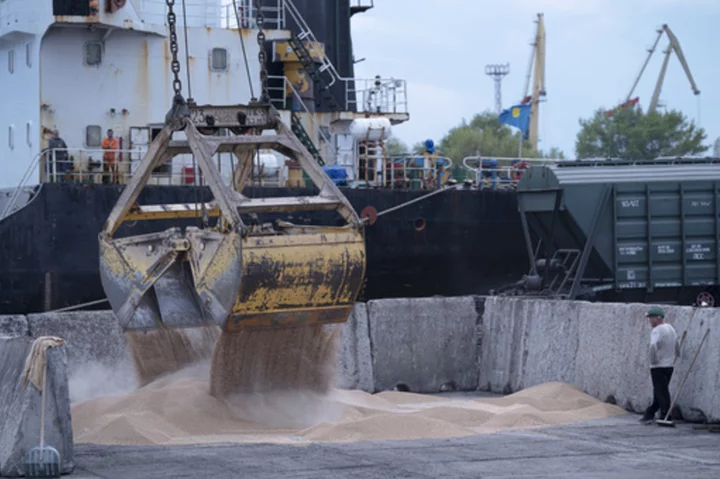ANKARA, Turkey (AP) — Russia agreed to extend a deal that has allowed Ukraine to ship grain through the Black Sea to parts of the world struggling with hunger, Turkish President Recep Tayyip Erdogan announced Wednesday, a boost to global food security after the war launched more than a year ago drove up prices.
“I want to give a good news,” Erdogan said. “With the efforts of our country, the support of our Russian friends and the contribution of our Ukrainian friends, the Black Sea Grain Initiative has been extended by another two months.”
Turkey and the U.N. brokered the breakthrough accord with the warring sides last summer, which came with a separate agreement to facilitate shipments of Russian food and fertilizer that Moscow insists hasn't been applied.
Russia had set a Thursday deadline for its concerns to be ironed out or had threatened to bow out. Such brinkmanship isn’t new: With a similar extension in the balance in March, Russia unilaterally decided to renew the deal for just 60 days instead of the 120 days outlined in the agreement.
Russian Foreign Ministry spokeswoman Maria Zakharova confirmed the extension, but neither she nor Erdogan immediately commented on any concessions Moscow may have received.
"We will continue our efforts to ensure that all the conditions of the agreement are fulfilled so that it continues in the next period,” said Erdogan, who announced the highly anticipated decision two days after being forced into a runoff in Turkey's presidential election.
Extending the Black Sea Grain Initiative is a win for countries in Africa, the Middle East and parts of Asia that rely on Ukrainian wheat, barley, vegetable oil and other affordable food products, especially as drought takes a toll. The deal helped lower prices of food commodities like wheat over the last year, but that relief has not reached kitchen tables.
In talks last week in Istanbul, Ukrainian Deputy Prime Minister Oleksandr Kubrakov said the grain deal “should be extended for a longer period of time and expanded” to “give predictability and confidence" to markets.
Moscow said it opposed such an expansion.
Meanwhile, Russia is rapidly shipping a bumper harvest of its wheat through other ports. Critics say that suggests Moscow is posturing or trying to wrest concessions in other areas — such as on Western sanctions — and claim it's dragged its heels on joint inspections of ships by Russian, Ukrainian, U.N. and Turkish officials.
Average daily inspections — meant to ensure vessels carry only food and not weapons that could aid either side — have steadily dropped from a peak of 10.6 in October to 3.2 last month. Shipments of Ukrainian grain also have declined in recent weeks.
Russia denies slowing the work.
The deal has allowed over 30 million metric tons of Ukrainian grain to be shipped, with more than half that going to developing nations. China, Spain and Turkey are the biggest recipients, and Russia says that shows food isn't going to the poorest countries.
U.N. Secretary-General Antonio Guterres says Ukrainian corn for animal feed has headed to developed countries, while “a majority” of grain for people to eat has gone to emerging economies.
Even if a “meaningful part” of the shipments headed to developed nations, that “has a positive impact to all countries because it brings prices down," Guterres told reporters in Nairobi, Kenya, this month. "And when you bring prices down, everybody benefits.”
William Osnato, a senior research analyst at agriculture data and analytics firm Gro Intelligence, said there had been “bluster” from Russia to push for easing some sanctions because it's shipping record amounts of wheat for the season, and its fertilizers are flowing well, too.
Trade flows tracked by financial data provider Refinitiv show that Russia exported just over 4 million tons of wheat in April, the highest volume for the month in five years, following record or near-record highs in several previous months.
Exports since last July reached 32.2 million tons, 34% above the same period from last season, according to Refinitiv. It estimates Russia will ship 44 million tons of wheat in 2022-2023.
With Ukraine’s wheat harvest coming up in June and the need to sell that crop in July, maintaining a Black Sea shipping corridor is key to avoid “taking another large chunk of wheat and other grains off the market,” Osnato said.
Ukraine also can send its food by land through Europe, but those routes have a lower capacity than sea shipments and have stirred disunity in the European Union.
It comes as places including Morocco, Tunisia, Algeria, Syria and East Africa — big importers of food — are facing drought and economic issues that are likely to keep food prices high.
“Shortages of food in the system and lack of affordable fertilizer continues to push up prices, making it difficult for families in countries like Somalia to predict if they will be able to afford a meal the next day,” said Shashwat Saraf, emergency director for East Africa at the International Rescue Committee.
___
Keaten reported from Geneva and Bonnell from London. AP reporters Evelyne Musambi in Nairobi, Kenya; Edith M. Lederer at the United Nations; and Dasha Litvinova in Tallinn, Estonia, contributed.

